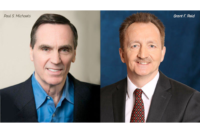In pointing out that the global business supply chain is “broken,” Mars CEO Grant Reid said business needs to lead “transformational change” in order to tackle the most urgent threats facing the planet and its people.
Speaking ahead of this month’s United Nations General Assembly and Climate Week in New York Wednesday, Reid said the responsibility had never been greater for industry: “If we are to help deliver on the targets agreed in Paris and the UN Sustainable Development Goals, there has to be a huge step change. While many companies have been working on being more sustainable, the current level of progress is nowhere near enough.”
Noting that “Mars has been in business for four generations and intends to be for the next four generations,” he said that “The only way that will happen is if we do things differently to ensure that the planet is healthy and all people in our extended supply chains have the opportunity to thrive. We must work together because the engine of global business – its supply chain – is broken, and requires transformational, cross-industry collaboration to fix it.”
As part of its response to these challenges, Mars unveiled its “Sustainable in a Generation Plan.” The $1-billion investment includes a set of far-reaching goals and ambitions underpinned by science and determination to drive impact throughout the extended supply chain. The three-pronged action plan includes the following:
- Healthy Planet – With an ambition to reduce environmental impacts in line with what science says is necessary to keep the planet healthy – focusing on climate action, water stewardship and land management. In keeping with that goal, Mars said it would reduce greenhouse gas emissions across its value chain by 67 percent by 2050, an ambitious expansion of previous GHG reduction goals.
- Thriving People – With an ambition to meaningfully improve the working lives of one million people in its value chain to enable them to thrive – focusing on increasing income, respecting human rights and unlocking opportunities for women. As a result, Mars launched the Livelihoods Fund for Family Farming to foster sustainability and poverty reduction in extended supply chains and the Farmer Income Lab, a collaborative “think-do tank” focused on generating the missing insights needed to eradicate smallholder poverty.
- Nourishing Wellbeing – With an ambition to advance science, innovation and marketing in ways that help billions of people and their pets lead healthier, happier lives. This continues on its current efforts around food safety and security; product and ingredient renovation; and responsible marketing.
“This plan is about not just doing better, but doing what’s necessary,” Reid emphasized. “We’re doing this because it’s the right thing to do, but also because it’s good business. Creating mutual benefits for the people in our supply chain, and mitigating our impact on the environment, are sound business choices. We also know that increasingly our consumers care about these issues as much as we do.
During the UN General Assembly, Mars also will reveal plans to engage consumers on this topic through one of the world’s biggest brands, M&M’S. The new campaign leverages Mars’ tremendous reach with consumers to champion the power of renewable energy and highlight the need for action in addressing climate change.
The company said it purchases enough wind power to offset the electricity needed for all U.S. production of M&M'S. Renewable energy also plays an important role in Mars’ Sustainable in a Generation Plan and key markets (United States & U.K.) already use it to power 100 percent of operations, with more markets to follow in 2018.
“Through our much-loved M&M’S brand, we can inspire consumers on this important topic and shine the spotlight on renewable energy – one of the solutions that will help us to tackle climate change and meet the UN Sustainable Development Goals,” Reid explained.
As Barry Parkin, Mars’ chief sustainability and health and wellbeing officer, stressed: “We know we cannot grow and prosper unless the planet, people and communities on which we rely are healthy and thriving.
"Doing what’s right, not just doing better, is at the very core of our new plan. It’s about pushing the boundaries and extending our bold ambitions across our extended supply chain. When we do that, and when others join us, only then will we have the greatest impact."







